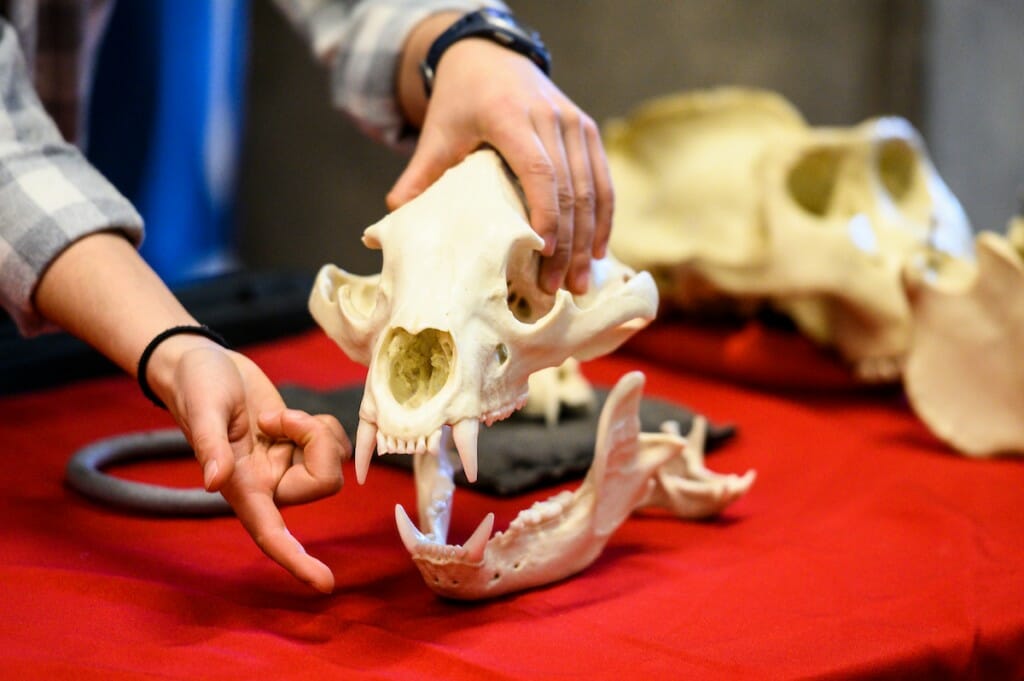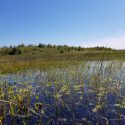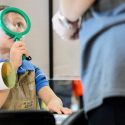Science Expeditions, Engineering Expo offer virtual events statewide April 9–11

A volunteer displays a bear skull during a Science Expeditions activity in 2019. Photo: Jeff Miller
Science Expeditions and Engineering Expo, marquee science-focused open houses that typically take place on the University of Wisconsin–Madison campus, will offer a bevy of largely virtual — but still hands-on — events across the state from April 9 to April 11.
Taking advantage of the proliferation of virtual events, both open houses will offer greater access than ever to research labs, at-home experiments and live science demonstrations. More than a dozen live, virtual events begin April 9, with many more available all weekend and even beyond.
Select in-person activities include outdoor, self-guided explorations of the Lakeshore Nature Preserve, UW–Madison Arboretum, and UW Space Place’s Planet Trek Dane County solar system tour along the Southwest Commuter Pike Path.
All events are free and open to the public. The virtual events will offer access not just to the Madison community, but across the state and around the world.
“As an open house, it’s really great to be able to welcome people from all over Wisconsin,” says Tom Zinnen, an outreach specialist with the UW–Madison Biotechnology Center and a co-organizer of Science Expeditions.
Live virtual events include an exploration of dinosaur backbones with the Geology Museum, lessons in gardening in space from the botany department, and a virtual tour of Great Lakes shipwrecks with the Wisconsin Historical Society.
Scientists will also lead several family-friendly, at-home experiments that use common household items to connect to campus research about chemistry, physics and electricity. Other research-linked, hands-on projects include making your own yogurt, creating a yeast-powered balloon, and extracting DNA from fruit. And the Wisconsin Society of Pharmacy Students will lead a constellation of eight events as part of a focus on the health sciences.
Some events will be interactive. For example, in one video, graduate student Benjamin Hall asks viewers where he should collect bacteria. Then, in a live presentation on April 11, he will share what kinds of bacteria grew from each location submitted by participants.
Normally, Science Expeditions offers a trolley to help visitors reach stations spanning campus. But this year, new events will be just a click away.
“One exciting thing about the virtual format is that participants can virtually walk around campus much quicker than past in-person Science Expeditions,” says Liz Jesse, a science outreach specialist on campus and co-organizer of Science Expeditions.
Similarly, Engineering Expo will offer a range of virtual events exploring the engineering campus.
“The Expo is releasing a bunch of videos for at-home activities, lab tours, demonstrations, miniature lectures and research talks,” says Matthew Stilwell, associate director of education and outreach for the Materials Research Science and Engineering Center.
The Expo is organized entirely by engineering students. Their videos will go live on April 9 and will be accessible all weekend.
“Our objective this year with the main focus of our audience being at home, is that students see engineering in a new light,” says Expo publicity chair Erin Konter. “Not everything needs to be done in an extravagant lab, or with expensive tools. Engineering is all around us every day.”
For a full list of events and activities, visit the Science Expeditions and Engineering Expo websites.
Tags: engineering, outreach, science



